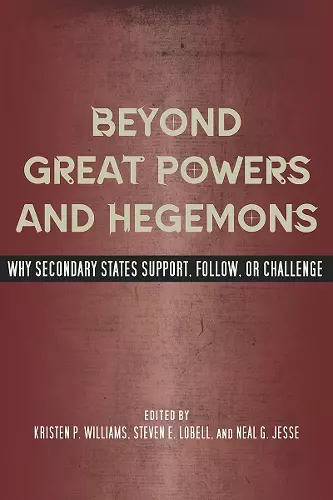Beyond Great Powers and Hegemons
Why Secondary States Support, Follow, or Challenge
Kristen P Williams editor Neal G Jesse editor Steven E Lobell editor
Format:Paperback
Publisher:Stanford University Press
Published:28th Mar '12
Currently unavailable, and unfortunately no date known when it will be back
This paperback is available in another edition too:
- Hardback£99.00(9780804771634)

This insightful exploration in Beyond Great Powers and Hegemons examines how smaller states interact with dominant powers, revealing their motivations and strategies.
This book provides a comprehensive framework and insightful case studies that examine the interests, motivations, objectives, and strategies of smaller states in their interactions with a regional or global hegemon. Beyond Great Powers and Hegemons adds a new perspective to the ongoing discourse about the dynamics between great powers and the weaker states that may choose to align with them or resist their influence. Unlike previous studies that primarily focus on the actions of larger powers, this book seeks to understand the complex motivations behind the responses of smaller states, whether they choose to follow or challenge the hegemon's objectives.
In Beyond Great Powers and Hegemons, the authors delve into the reasons why weaker states may support or oppose the policies of dominant global or regional powers. They investigate how these states navigate their relationships with hegemons, exploring whether they possess the capacity to challenge the hegemon’s core strategies. By examining the interests and actions of these 'followers', the book highlights the nuanced ways in which smaller states assert their agency in the international arena.
The analysis encompasses both historical and contemporary case studies from various regions, including Europe, Latin America, the Middle East, Africa, Asia, and South Asia. By addressing a broad spectrum of interests—political, economic, and military—the book uncovers the domestic and international factors that shape the motivations and actions of weaker states, contributing to a richer understanding of global power dynamics.
"Beyond Great Powers and Hegemons illustrates how secondary and tertiary states must balance short-term and long-term risks and domestic and international pressures when dealing with hegemons. The authors convincingly demonstrate that regime type does not play the critical role in the decision making process . . . As the world continues to shift toward an unbalanced multipolar power structure where emerging states will try to assert their influence, this volume's findings may prove to be especially important. This book overall is an excellent addition to international relations theory and may provide the foundation for understanding an increasingly complex international system."—Preston Musgrave, Journal of Peace Research
"[T]he book provides a strong overview of the relevant literature on hegemon theory and the growing typology of behaviors that are used to explain the actions of secondary states . . . The editors' decision to include a wide range of historical and geographic case studies is to be commended . . . Beyond Great Powers and Hegemons will provide a useful addition to any interested scholar's library. It demonstrates that hegemony is more than simply a one-way relationship, as secondary states have a significant array of foreign policy tools with which to influence and shape exchanges with other states. In an age when China's rise is seen as the determining factor in Asia's future, this book makes an important argument that secondary states will also play an important role in deciding and shaping its rise and the path the region will take."—Andrew Carr, Asian Politics & Policy
"The book offers a dozen interesting case histories of responses to global hegemons and regional powers, the best of which delve into the domestic politics of secondary states and the ways in which political elites and interest groups are strengthened or weakened by ties to hegemons and, in turn, how this shapes the national orientation."—G. John Ikenberry, Foreign Affairs
"The variety of actors and settings sampled by the chapter authors is rich and diverse . . . The editors and authors are right to raise questions about why the preferences of powerful actors are not always heeded. Whether or not global politics is characterized by unipolarity, the questions remain germane. This volume offers information, arguments, and a number of suggestive hints about these issues and certainly has value in that respect."—William Thompson, H-Diplo, H-Net Reviews
"Beyond Great Powers and Hegemons examines how secondary and tertiary states respond to the policies of primary states, a still understudied topic of immense contemporary importance. Drawing on diverse historical and regional cases, the authors provide compelling insights for the management of America's international power."—David A. Lake, University of California, San Diego
"Informed and informative, 'Beyond Great Powers And Hegemons' is highly recommended reading and a significant contribution to academic library 'International Studies' and 'Political Science' reference collections and supplemental reading lists."—James A. Cox, Midwest Book Review
ISBN: 9780804771641
Dimensions: unknown
Weight: 363g
272 pages